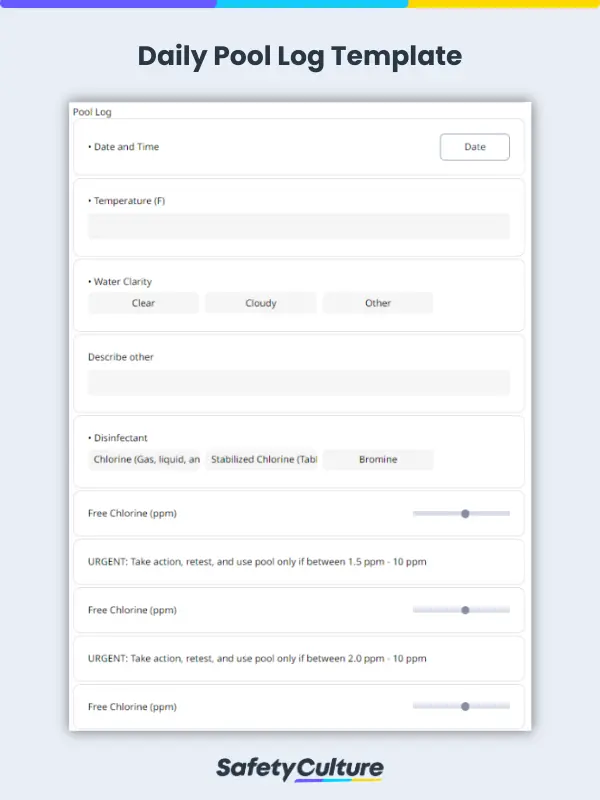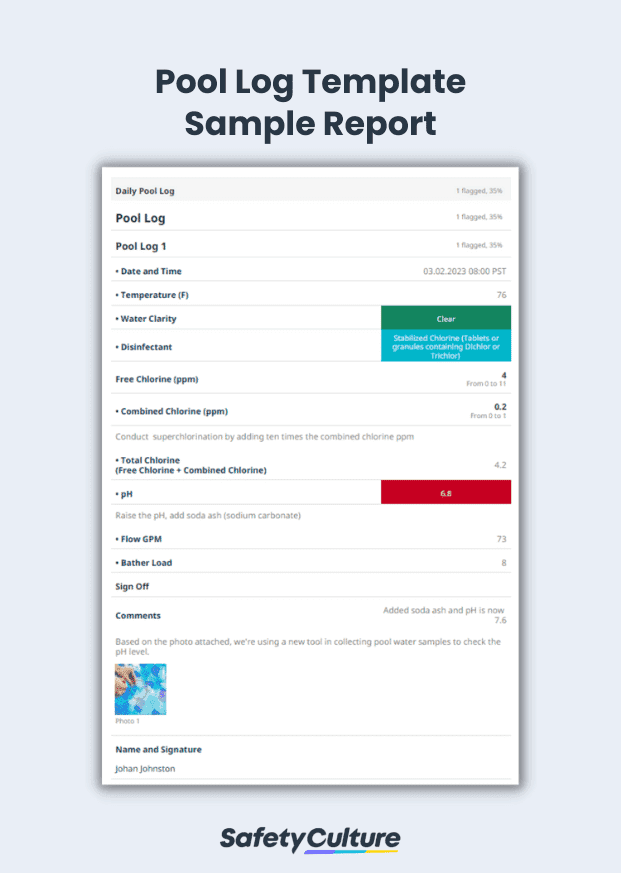What is a Pool Log?
A pool log sheet is a tool used by certified pool operators or pool managers to record findings and actions performed during regular pool maintenance checks. It helps ensure that vital information such as the date and time of checking, pH, alkalinity, temperature, and other information are consistently recorded daily or as required by state or local regulations. Regular checks and proper pool maintenance are proactive safety measures to help prevent swimming-related disease outbreaks.
Importance of Regular Pool Maintenance Checks
Daily pool maintenance checks are routine, but they are essential in making sure that swimming pools are fit for daily use. Here are compelling reasons why pool maintenance checks should be done regularly.
Quality
Maintaining the quality of swimming pools in commercial establishments such as spas, hotels, and water parks helps ensure that swimmers and customers get the best experience. Visually inspecting the water is not enough to gauge quality; that is why pool operators help determine if swimming pools are still within the ideal conditions (e.g., the right pH to avoid eye irritation) by conducting tests during checks.
Safety
Maintaining ideal levels of chlorine, water, air temperature, etc., helps promote health and safety for swimmers and keeps health risks to a minimum. Also, chlorine is not the only precaution to maintain the safety of pool water. Pool operators also need to make sure that the ideal temperature is maintained (to control algae) and that there is no vomit, fecal matter, or blood contamination from pool-related incidents. In case of such incidents, the swimming pool must be closed and disinfected per regulations.
Legal Compliance
Pool operators are required either by state or local regulations to keep a record of pool logs (usually around 2 years) containing the details of regular maintenance checks and to show proof that ideal and safe pool conditions are maintained during operations. The establishment’s permit to operate swimming pools may not be renewed due to non-compliance.
How to Perform Effective Pool Maintenance
In conducting effective pool maintenance, it’s important to remember the 3 C’s:
Circulation
Since moving or circulating water is cleaner and safer, good water circulation helps prevent issues like pool algae infestation and cloudy water. Ideally, you must run your pool pump or filter 24 hours a day, 7 days a week. If this isn’t feasible, the recommended minimum is to keep it running for at least 10 to 12 hours a day. This way, pool water will be turned over a few times enough to keep your pool safe and clean.
Cleaning Schedule
Follow a strict cleaning schedule to help make your pool not just look great but also safe to use and free from risks of bacterial contamination. At least weekly, make sure to skim, brush, and vacuum your pool to keep debris out of the water and help keep your pool walls clean. Alternatively, you can also set up and use an automatic pool cleaner.
Chemistry
It’s also a must to conduct pool water tests to identify what actions need to be taken when balancing it. In pool water chemistry, there are 3 key aspects you should check:
- pH levels – The ideal range for pools must be kept at 7.4 to 7.6.
- Alkalinity – The recommended range for pools is 100 to 150 parts per million (ppm).
- Sanitizer levels – Proper levels may vary based on the type of sanitizer being used.
During pool maintenance and inspection checks, these 3 aspects must be monitored, and actions must be taken to ensure these ideal levels are achieved. One great way to do so is to use a pool log sheet for easier data capturing and recordkeeping.
What to Include in a Pool Log Sheet
To help you perform more efficient pool maintenance, you must ensure that all essential information is captured for recordkeeping and future reference. Here are the most basic details you must consider including in your pool log sheet template:
- Title Page – Provide the pool name, the month and year of the inspection, the name of the pool operator or manager, and the pool’s location.
- Daily Pool Log – Record your checks, findings, and other urgent concerns needing immediate attention
- Sign-off – State comments and recommendations, if any. Also, include the name and signature of the one who conducted the maintenance check.
FAQs About Pool Logs
To ensure their safe use, pools are best maintained weekly and monthly. Daily logs, however, must also be kept to help regularly check pH levels, alkalinity, and other physical conditions. This way, pool operators and managers can monitor recurring concerns and avoid putting public health at risk.
The most recommended frequency of checking pool levels (chlorine and pH) is every two weeks. Although, you can always use a daily pool log sheet to maintain proper water chemistry and avoid doubling the amount of work needed.
Since maintaining pools involves the use of chemicals, various laws and regulations apply depending on the state or country. For legal compliance, it’s best for pool owners, operators, and managers to keep daily pool chemical log sheet records for at least 1 to 3 years.



